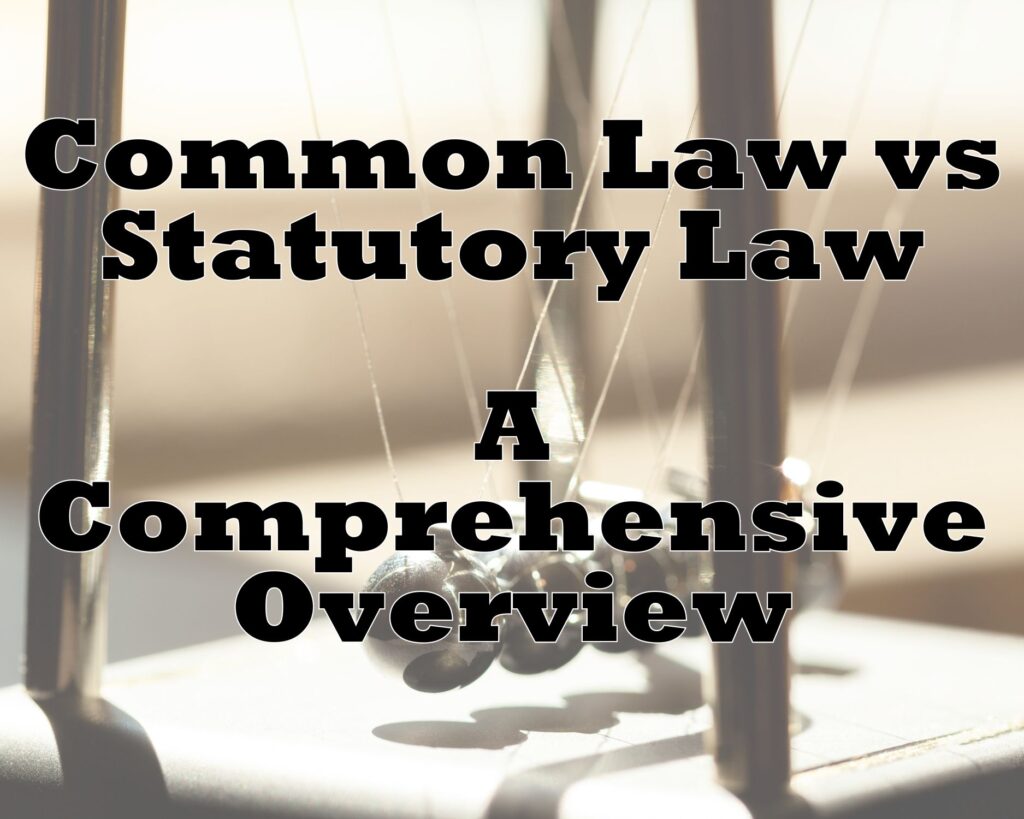The legal landscape is often shaped by two primary sources of law: common law and statutory law. Understanding the differences between these two is crucial for anyone interested in the legal system, law studies, or simply gaining a better grasp of how laws govern our society. This article provides a detailed comparison of common law vs statutory law, exploring their origins, characteristics, and how they function in the legal system. Common Law vs Statutory Law: A Comprehensive Overview Lets dive in!
What is Common Law?
Common law, also known as case law or judge-made law, is a body of law that is derived from judicial decisions of courts rather than statutes or written laws. The defining characteristic of common law is that it arises as precedent. In common law systems, courts look to past decisions (precedents) to synthesize the legal principles of past cases. This system is based on the principle of stare decisis, meaning that similar cases should yield similar results, providing consistency and predictability in the law.

What is Statutory Law?
Statutory law, on the other hand, is the body of law enacted by a legislature or other governing body. It is written law, as opposed to common law, which is created by judges through court decisions. Statutory laws are passed by legislative bodies at the local, state, or federal level and are codified in statutes. These laws are explicit, written rules that are meant to guide and govern behavior within society.
Key Differences Between Common Law and Statutory Law
- Source of Law:
- Common Law: Arises from judicial decisions and court rulings.
- Statutory Law: Created and enacted by legislative bodies.
- Flexibility and Adaptability:
- Common Law: More flexible, as it evolves with each new court decision.
- Statutory Law: Less flexible, as changes require legislative action.
- Precedent and Interpretation:
- Common Law: Heavily reliant on precedent; subsequent cases are decided based on previous rulings.
- Statutory Law: Based on the interpretation of written statutes; courts interpret these laws when applying them to individual cases.
- Scope and Detail:
- Common Law: Often more general, covering broad areas of law.
- Statutory Law: Usually more detailed, addressing specific issues or situations.
The Interplay Between Common Law and Statutory Law
In practice, common law and statutory law often interact and influence each other. Statutory laws can be created to codify common law principles or to overturn an undesirable common law ruling. Conversely, common law can fill gaps in statutory law, providing rules and interpretations where statutes are silent or ambiguous.
Exploring the ‘Whys’ of Common Law vs Statutory Law
Understanding the reasons behind the existence and functioning of common law and statutory law is crucial for a deeper comprehension of the legal system. Let’s delve into the ‘whys’ of these two fundamental types of law.
Why Does Common Law Exist?
- Historical Development: Common law originated in England and was developed through centuries of court decisions. It exists as a result of historical legal practices and the need for consistent, yet adaptable, legal principles.
- Flexibility and Adaptation: Common law allows the legal system to adapt to new situations and societal changes without waiting for legislative action. This flexibility is crucial in addressing unique cases that statutes may not specifically cover.
- Consistency and Predictability: By relying on precedents, common law provides a level of predictability and consistency in legal rulings, which is essential for fairness and justice in the legal process.
Why Does Statutory Law Exist?
- Explicit Lawmaking: Statutory law exists to provide clear, explicit, and written laws that govern society. It is a way for the legislative body to express the will of the people and address specific societal needs and issues.
- Clarity and Specificity: Statutory laws are often more detailed and specific than common law, providing clear guidelines and regulations for specific situations, which helps in reducing ambiguity in legal interpretations.
- Democratic Process: Statutory law represents the democratic process, where elected representatives create laws that reflect the values and needs of the society they represent.
Why Do Common Law and Statutory Law Interact?
- Complementing Each Other: Both types of law complement each other, with statutory law often providing the framework within which common law principles operate. Common law fills in the gaps and interprets statutory provisions.
- Dynamic Legal System: The interaction between common law and statutory law ensures a dynamic and responsive legal system that can adapt to changing societal values and circumstances.
- Balancing Flexibility and Stability: While common law offers flexibility and adaptability, statutory law provides stability and predictability. Their interaction balances these two essential aspects of the legal system.
Why is Understanding Both Important?
- Comprehensive Legal Knowledge: A thorough understanding of both common law and statutory law is essential for legal professionals, students, and individuals to navigate the legal system effectively.
- Informed Decision-Making: Understanding both types of law enables better decision-making, whether in legal practice, policy-making, or personal legal matters.
- Appreciating Legal Evolution: Recognizing the roles and interplay of common law and statutory law helps in appreciating the evolution of legal systems and the ongoing development of law.
The existence and interaction of common law and statutory law are foundational to the functioning of the legal system. Understanding the ‘whys’ behind these types of law provides insight into how justice is administered and how laws evolve to meet the needs of society. This knowledge is crucial for anyone engaged with the law, whether professionally or personally.
Legal Know It All offers a variety of articles that can provide further insights into legal topics, including those related to common law and statutory law. Here are some articles from their website that you might find helpful and relevant:
- Common Law Marriage in California: A Detailed Exploration: This article delves into the specifics of common law marriage in California, providing a deeper understanding of how common law principles apply in different legal contexts.
- Mastering the Art of Legal Argumentation: Strategies for Success: For those interested in the practical application of legal principles, this article offers valuable strategies for effective legal argumentation, a skill that intertwines with understanding different law forms.
- Understanding Power of Attorney: A Simple Guide to Making the Right Choice: This guide provides insights into the legal instrument of Power of Attorney, showcasing how statutory laws govern such legal documents.
These articles from Legal Know It All can enhance your understanding of various legal concepts, including the nuances of common law and statutory law. They offer valuable perspectives for anyone looking to deepen their legal knowledge.
Common Questions and Answers on Common Law vs Statutory Law
Q: What is the main difference between common law and statutory law? A: The main difference lies in their sources. Common law is derived from judicial decisions and court precedents, while statutory law is created and enacted by legislative bodies.
Q: Can common law override statutory law? A: Generally, statutory law takes precedence over common law. If there is a statutory law in place, it usually overrides common law, especially if the statute explicitly contradicts existing common law.
Q: How does common law adapt to changing societal norms? A: Common law adapts through the decisions made in new court cases. As judges rule on cases, they interpret and apply existing laws to contemporary situations, allowing the law to evolve with society.
Q: Why is statutory law considered more stable than common law? A: Statutory law is more stable because it is explicitly written and passed by a legislative body, making it less subject to interpretation compared to common law, which evolves through judicial decisions.
Q: In what situations is understanding both common law and statutory law important? A: Understanding both is crucial in legal practice, policy-making, and even in personal legal matters. It helps in interpreting legal situations accurately and making informed decisions.
As an Amazon Associate we earn from qualifying purchases through some links in our articles.




